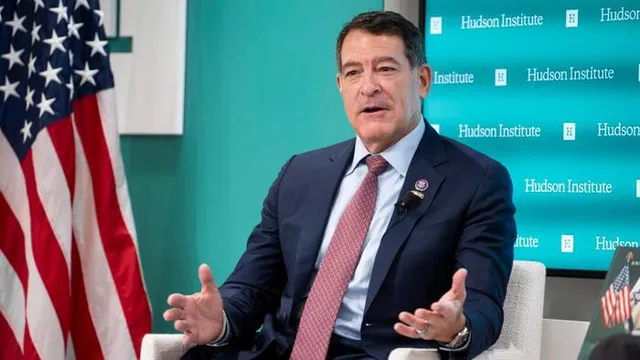
Mark Green resigns after Congress finalizes Trump’s policy bill
2025-06-11 15:00- Mark Green plans to resign from Congress after the House votes on Trump's policy package.
- His resignation triggers a special election to fill his seat and impacts the Republican majority in the House.
- Green's departure marks a significant shift in the current political landscape, emphasizing the need for Republican leaders to strategize.
Express your sentiment!
Insights
In the United States, Mark Green, a member of the House of Representatives from Tennessee, announced his decision to resign from Congress. This announcement came shortly after a commitment to oversee President Donald Trump's budget bill's passage through Congress. Green's departure will trigger a special election to fill his seat, further reshaping the slim Republican majority in the House. Previously, during his tenure, Green had been an outspoken supporter of border security measures and was notably the chairman of the House Homeland Security Committee, where he advocated for the impeachment of former DHS Secretary Alejandro Mayorkas. His shift to the private sector was described by Green as a once-in-a-lifetime opportunity contributing to his early exit from his congressional responsibilities. Green, who represented Tennessee's 7th Congressional District since 2019, initially had planned to retire at the end of the previous Congress but had later decided to stay on due to pressures from fellow Republicans and the Trump administration. He positioned himself to ensure that conservative policies were pushed forward during his service, particularly in immigration and border control. His tenure has been marked by significant events, including overseeing committee efforts to impeach Mayorkas, emphasizing his commitment to the Republican agenda. His resignation comes at a time when the House is experiencing a narrow majority with 220 Republicans versus 212 Democrats and several vacancies arising from recent Democratic departures. Special elections are expected to take place promptly following Green’s resignation, impacting the Republican strategy to maintain their majority. As Green prepares to transition to the private sector, the political landscape will evolve, requiring Republican leaders to address the repercussions of his early departure on legislative efforts, particularly in ongoing negotiations surrounding Trump’s policy initiatives. Mark Green's resignation has been perceived as a pivotal moment, as it could further weaken the already delicate balance of power in Congress. This scenario reflects broader trends within the Republican party as they grapple with maintaining cohesion and effectiveness amid slim margins allowing for little mistake in legislative discussions. While the future role of his successor remains uncertain, it is anticipated that the district will continue to lean Republican, preserving the party’s influence in the House in the likely event of a Republican candidate succeeding him.
Contexts
Special elections serve as a crucial aspect of the U.S. electoral system, especially for Congress, where they can have substantial implications for party control, policy direction, and voter engagement. These elections often arise in response to vacancies caused by resignations, deaths, or other circumstances that necessitate the swift filling of Congressional seats. The timing and outcomes of special elections can lead to shifts in political power that influence legislative agendas and strategies for both major parties. With control of the House and Senate frequently leaning on a slim margin, these elections hold significant weight, as even a single seat can alter the balance of power in Congress. Typically, special elections attract varied levels of voter interest and turnout compared to regular election cycles. Lower voter participation is often noted, primarily due to the non-scheduled nature of these elections, which can lead to challenges for candidates trying to mobilize support. However, there are instances where special elections ignite intense public engagement, often driven by pressing political issues, high-profile candidates, or the impact of larger national trends. This engagement can result in unexpected outcomes which could either reinforce or disrupt the prevailing political landscape. The implications of successful candidacies in special elections can extend beyond mere party control; they often set the stage for future political battles and influence the next general elections. Candidates elected in special elections may seek to leverage their victories to build momentum for re-election campaigns or to push for specific policies that can resonate with the electorate. The dynamics ensuing from these elections contribute to shaping party strategies, positioning, and even the platforms adopted leading up to general elections. Moreover, the presence of high-stakes issues—such as healthcare, economic conditions, or significant social movements—can amplify the importance of issues raised during these contests. In summary, special elections for Congress are integral to the political fabric and can significantly impact both immediate legislative effectiveness and long-term party strategies. While they may seem like isolated events, their influences extend well into the broader electoral context, highlighting the potential for both political opportunity and risk. Observers of the U.S. political landscape must treat special elections with due diligence, understanding their capacity to drive significant change within Congress and to influence the political narrative that shapes future electoral contests.